|
Hinduism Dancing elephants, a bible book full of sexual positions, multi-armed killing machines, institutionalized class warfare, yoga, karma, swamis and gurus... If all this sounds like a good time, then you might just be a Hindu.
Dancing elephants, a bible book full of sexual positions, multi-armed killing machines, institutionalized class warfare, yoga, karma, swamis and gurus... If all this sounds like a good time, then you might just be a Hindu. Hinduism is the third largest religion in the world, and one of the oldest to boot. Hinduism is incredibly diverse, but there are a couple of identifying features. Almost all Hindus believe in karma and reincarnation, a pantheon of gods and the sacred importance of the Vedas, a set of hymns written in Sanskrit. Although Hinduism is now practiced primarily by ethnic Indians and Asians, its origins date back to the invasion of the Indian subcontinent by tribes of roaming Aryans. Despite what some people would like you to think, the word Aryan is actually Sanskrit in origin. Before the Nazis hijacked the term, it referred to a race of mixed Indian and European ethnicity. Although some of the Vedas are believed to be older, most can be dated to the time of the Aryan invasion around 1200 B.C. The hymns themselves are largely concerned with praising the major Hindu deities and chronicling their activities.
Brahman is a singular "God" for most meaningful purposes, and Hinduism is technically monotheistic. But the idea of Brahman is subtle and complex. Fortunately, Hindus believe in a series of secondary god-figures who provide more bang for your entertainment buck. There are so many of these gods that most Westerners assume Hinduism is polytheistic, and more than a few Hindus as well. The top three gods are Brahma, Vishnu and Shiva. Brahma is generally considered the creator god (although there is no one consistent Hindu creation fable), Vishnu is the protector, and Shiva—famously—is the destroyer. The three together represent the primal forces of the universe.
Another popular figure among Westerners is Kali, a kick-ass goddess of destruction who has as many superpowers as she does arms—and she has quite a few arms. Kali wears a a necklace made from men's skulls. She's the goddess of death and radical transformation, and she's also the goddess in charge of time—specifically, its ending. Hindus believe that time runs in cycles, ages known as yugas which have variable durations. Each cycle is more or less a history of the world, which ends at the end of the cycle. The current cycle is ruled by Kali, and scheduled to last 432,000 years. Or possibly 1,200 years, or possibly 4,320,000 years. The math is a little fuzzy. At the end of the Kali Yuga, Kali will do her destruction and transformation thing... and that will be that. Depending on your calculator, the end times could arrive anytime between next Tuesday and three million years from now. Fortunately, there are things you can do to prepare yourself for the end of time. Once you get past the colorful dancing elephant gods, these practices are what Hinduism is really about.
You can't refine your soul overnight, however. Hindus believe it takes many lifetimes to achieve moksha, ultimate freedom from the slavery of fleshly desire. In each lifetime, good works and disciplined pursuit of moksha improve your karma. Karma is your batting average over many lifetimes, the principal that your position in the world is the sum total of your actions in previous lifetimes. If you improve your karma, your status in life improves in the next incarnation. The principal of karma is based on the notion that the universe is somehow inherently moral. This may be difficult to swallow if you've happened to live in the universe for any length of time. However, Hindus take it very, very seriously.
And your next lifetime is pretty much your only hope for rising through the castes. A caste is strictly enforced social class; there are four hereditary castes in Hindu India, with numerous sub-castes in each. At the bottom of the ladder there is a fifth grouping—the pariahs, or untouchables.
Hinduism and Buddhism grew up side by side in South Asia, and they strongly influenced each other. The concept of karma and the practice of yoga are now widespread in Buddhism, as are the sexual practices of tantra. Tantra is set of rituals and practices that seek to use sexual techniques to achieve unity with the divine. Practitioners use kundalini yoga (moving energy through the body's chakras), sexual intercourse and masturbation to help rid the mind of distractions and obliterate that pesky sense of identity that keeps us all from being one with God. One thing that makes Hinduism cooler than, say, Christian Science, is its astonishing variety of its spiritually sanctioned sexual practices and its enthusiastic celebration of the same. A staple of Hindu scripture is the Kama Sutra, a virtual encyclopedia of sexual practices and positions. It makes for better reading than Leviticus.
|
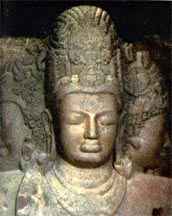 Hindus believe in a cosmic life force called Brahman that pervades the universe and is embedded within everything that exists, including humans.
Hindus believe in a cosmic life force called Brahman that pervades the universe and is embedded within everything that exists, including humans. 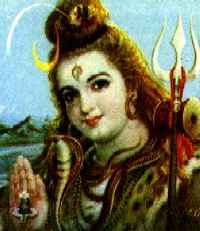 After this top tier, there is a virtually endless list of second-string deities, among them (in no particular order) Lakshmi, Krishna,
After this top tier, there is a virtually endless list of second-string deities, among them (in no particular order) Lakshmi, Krishna, 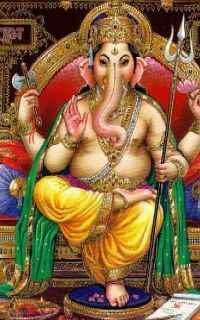 Some of these gods are more appealing to Westerners than others. Ganesh, the elephant headed god, is particularly popular, due to his role as the patron of success and remover of obstacles. (For some reason, displaying a Ganesh statue looks less stupid and superstitious that carrying a
Some of these gods are more appealing to Westerners than others. Ganesh, the elephant headed god, is particularly popular, due to his role as the patron of success and remover of obstacles. (For some reason, displaying a Ganesh statue looks less stupid and superstitious that carrying a 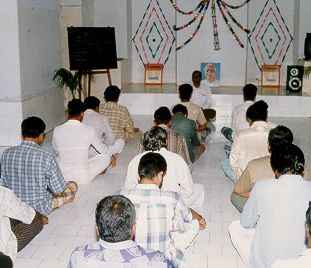 Hindus believe that the purpose of life is to refine your soul until you are one with the absolute reality of the universe. There are several ways to do this, including right-minded living and good works, as well as mental and physical disciplines. The prevalent method of refining the soul is yoga—not the low-impact fitness class prevalent in the West, but the full-bore mystical meditative practice designed to unite the soul with God.
Hindus believe that the purpose of life is to refine your soul until you are one with the absolute reality of the universe. There are several ways to do this, including right-minded living and good works, as well as mental and physical disciplines. The prevalent method of refining the soul is yoga—not the low-impact fitness class prevalent in the West, but the full-bore mystical meditative practice designed to unite the soul with God. 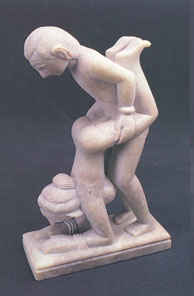 Hindus may not marry outside their caste, and they can only have jobs appropriate to their caste. It's possible to upgrade your caste during a single lifetime, but frankly, it's easier just to be reincarnated.
Hindus may not marry outside their caste, and they can only have jobs appropriate to their caste. It's possible to upgrade your caste during a single lifetime, but frankly, it's easier just to be reincarnated.